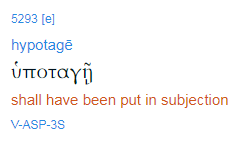
This is part of a series on patriarchy, headship, and submission. See this index.
When I wrote “The Context of Genesis 3:16”, I looked at how the context of Genesis 3:16 could be combined with that of Ephesians 5 and 1 Peter 3. Regarding the submission in Ephesians 5, I had this to say:

Here 6 English words are needed to fully convey the meaning of this single Greek verb. Because Bible translators are rarely this verbose, this makes correctly capturing the sense that much more difficult, and is often poorly done. This simplification leads to all sorts of doctrinal errors. Don’t believe me? Consider this:

The English translates this as…
[whatever] you bind on earth will be bound
…instead of…
[whatever] you shall bind on earth shall have [already] been bound
The former permits the Petrine apostolic succession of Roman Catholicism while the more verbose latter does not. This is important!
Now, let’s consider how the Greek word for submission (hypotassō) can carry a variety of senses and have very different meanings according to its ‘voice’:
active — to subject another.
middle — to submit oneself.
passive — to be subjected upon.
Many people interpret the submission mentioned in Ephesians 5 as if it were of the active/passive variety, rather than the middle. In order to illustrate this, we will compare and contrast how Paul uses the word in these three words to show that Paul was not referring to authority in Ephesians 5 and that native speakers understood this intuitively by the way the words were used.
Paul uses the word “submit” three times in Ephesians 5, but just once in Ephesians 5:22-24, the major point of contention. Indeed, he elides the verb to relatively de-emphasize it. By contrast, he emphasizes the word “love” a total of six times in his instructions to husbands. He uses the head-body metaphor of unity, once referring to head and thrice to the body. The context of that submission is for all believers to submit to each other (see v21). The word “submit” is used in the middle voice.
Now let’s go over to 1 Corinthians 15:27-28:
It is interesting to note how the translators partially elided the word submit in 1 Corinthians 15:27-28, going with “has put” “has done”, and “who put” instead. Meanwhile, the same translators inserted the elided verb into Ephesians 5:21-22 and split the sentence into two paragraphs. These alterations clearly change the emphasis of the submission from that found in the originals.
Anyone who suggests that Paul is speaking of a subordination or authority in Ephesians 5 is missing the fact that Paul didn’t use the right language if that is what he intended. English translations serve to hide what was clear to native speakers. To illustrate this fact, as I did here, we turn to John Chrysostom, who wrote on Ephesians 5 in the late 4th century.
Chrysostom wrote that the “washing in the Word” was baptism into the church by the name of the Father, Son, and Holy Spirit (i.e. Matthew 28:19), whereby the uncleanness of its members was washed away. Chrysostom then wrote that because a husband’s bride is defective, he should not to seek from his wife that which she does not possess, but rather to seek for themselves the spiritual adornment that Christ placed on his bride. In other words, he reads in v.25-26 a command that husbands are to personally seek the spiritual glorification that the church received in the washing by the word. To love their wives, husbands must be washed in the word not do the washing! He says…
Paul’s commands to husbands are inward focused, as I pointed out in “The Context of Genesis 3:16” (quoted above):
John Chrysostom—a native speaker of Greek—didn’t make the same mistakes that modern English speakers make. He didn’t read Ephesians 5 and think “husbands must wash their wives in the word of God by being their spiritual leader.” Why not? Because the that isn’t what Paul was instructing!
This is why, in his commentary on the book of 1 Corinthians, he made this point:

Pingback: Christian Discernment
Pingback: The Structure of Ephesians 5
Pingback: Mutual Submission